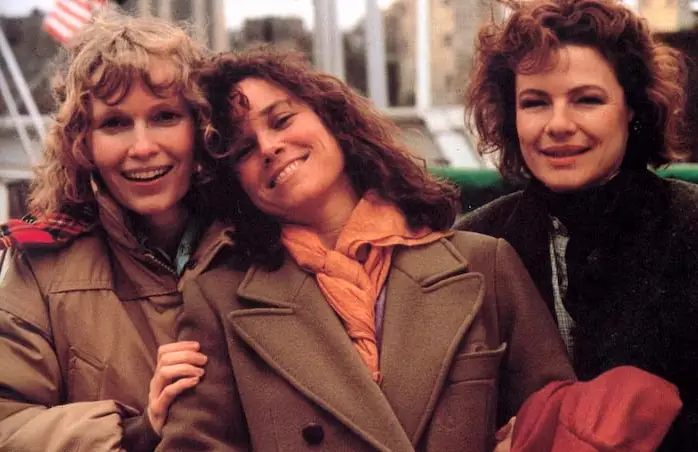
Director: Woody Allen
Producer: Robert Greenhut, Charles H. Joffe, Jack Rollins (Orion)
Writer: Woody Allen (screenplay)
Photography: Carlo Di Palma
Music: James V. Monaco
Cast: Mia Farrow, Michael Caine, Woody Allen, Barbara Hershey, Dianne Wiest, Max von Sydow, Carrie Fisher, Maureen O’Sullivan, Lloyd Nolan, Daniel Stern, Tony Roberts, Joanna Gleason, John Turturro, Julia Louis-Dreyfus
![]()
Introduction
There’s a scene in Manhattan (1979) where Woody Allen’s character is embarrassed by a tell-all book by his ex-wife (Meryl Streep), detailing all his personal flaws. Since Allen was also the film’s writer, these critiques serve as Allen’s own honest admissions of his real-life insecurities, including, “In his most private moments, he spoke of his fear of death, which he elevated to tragic heights.”
It’s this idea that is expanded upon in Hannah and Her Sisters, as Allen focuses on his own existential crisis, a personal battle with the meaning of life and the prospect of death, and how our many relationships with others help to shape the time we are here. As such, Hannah and Her Sisters may simultaneously be the most profound and bare-boned of all of Allen’s films, taking the many themes he had built up to that point in his career and combining them in blatant self-expression in a 1986 Best Picture nominee that Roger Ebert called “the best movie [Woody Allen] has ever made.”
![]()
Plot Summary
The film spans three Thanksgivings over a period of two years, beginning and ending on Thanksgiving Day with another in between. The holiday dinner table provides the perfect window into familial relationships, and judging from the title, the whole thing revolves around New York cater waitress, Hannah (Mia Farrow), and her two sisters. Holly (Dianne Wiest) feuds with her opportunist friend April (Carrie Fisher) over the rights to Broadway auditions and a studly architect. Lee (Barbara Hershey) dates misanthropic painter Frederick (Max von Sydow), but finds herself in a forbidden mutual attraction with Hannah’s husband, Elliot (Michael Caine), with whom she has an affair.
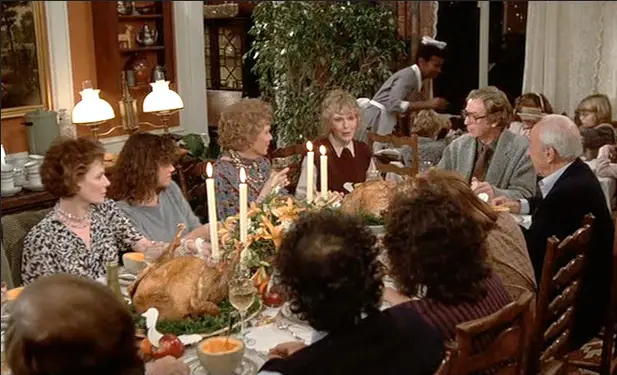 Meanwhile, we’re also introduced to the ulcerous lifestyle of Hannah’s infertile, hypochondriac ex-husband, Mickey Sachs (Woody Allen), who quits his job as a TV producer to stress over what he believes to be a terminal brain tumor. As much as the film occupies itself with Hannah and her sisters, it spends equal time exploring Mickey’s existential crisis (the theme most near and dear to Allen’s heart), following his neurotic meditations on life’s biggest questions and multiple religious conversions.
Meanwhile, we’re also introduced to the ulcerous lifestyle of Hannah’s infertile, hypochondriac ex-husband, Mickey Sachs (Woody Allen), who quits his job as a TV producer to stress over what he believes to be a terminal brain tumor. As much as the film occupies itself with Hannah and her sisters, it spends equal time exploring Mickey’s existential crisis (the theme most near and dear to Allen’s heart), following his neurotic meditations on life’s biggest questions and multiple religious conversions.
![]()
Glorious Ensemble
While undoubtedly daring from a thematic standpoint, the film may also have been Allen’s most daring undertaking in practical breadth, requiring that he conduct more human components than any of his prior films. With roughly nine equal acting parts, Hannah and Her Sisters remains one of the screen’s finest examples of ensemble casting, allowing Mia Farrow to work with her own mother, Maureen O’Sullivan (Tarzan‘s Jane), and Allen the chance to work with his long-admired Swedish actor, Max von Sydow, who starred in 13 films by Allen’s favorite director, Ingmar Bergman (The Seventh Seal).
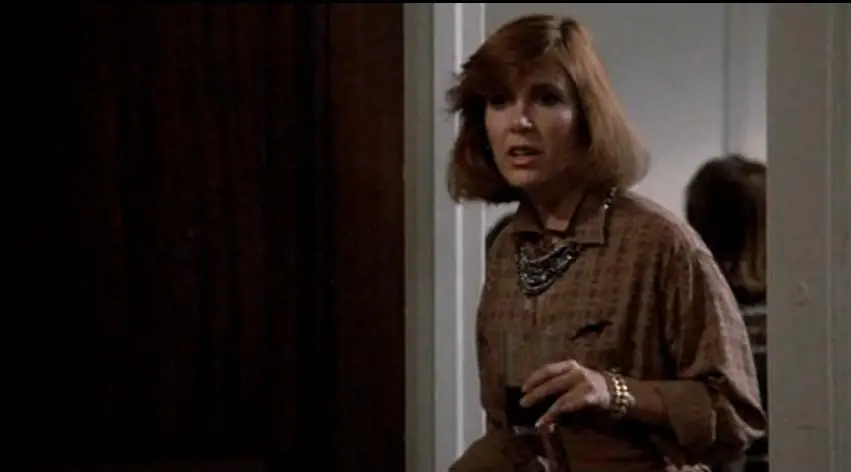 The deep cast would also provide a platform for up-and-comers like Daniel Stern (Home Alone), John Turturro (The Big Lebowski) and Julia Louis-Dreyfus (Seinfeld), who may have carried Woody Allen’s neuroses into George Costanza. The film also boosted the careers of familiar ’80s sweethearts, giving Carrie Fisher a romantic comedy to transition from The Return of the Jedi (1983) to When Harry Met Sally (1989), and a never prettier Barbara Hershey, who appeared with Gene Hackman in Hoosiers (1986) the same year.
The deep cast would also provide a platform for up-and-comers like Daniel Stern (Home Alone), John Turturro (The Big Lebowski) and Julia Louis-Dreyfus (Seinfeld), who may have carried Woody Allen’s neuroses into George Costanza. The film also boosted the careers of familiar ’80s sweethearts, giving Carrie Fisher a romantic comedy to transition from The Return of the Jedi (1983) to When Harry Met Sally (1989), and a never prettier Barbara Hershey, who appeared with Gene Hackman in Hoosiers (1986) the same year.
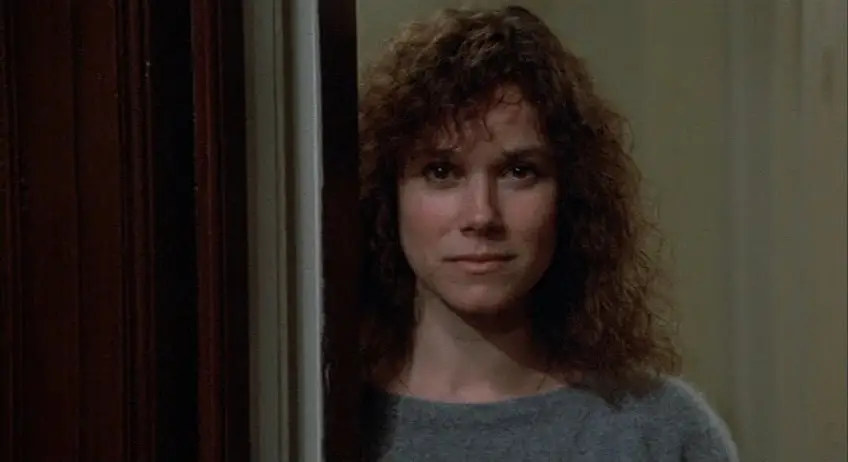 Most importantly, the film provided an award-winning opportunity for a pair of accomplished veterans. After three Academy Award losses for Alfie (1966), Sleuth (1972) and Educating Rita (1983), Michael Caine finally won the Oscar for Hannah, beating out Platoon‘s Tom Berenger and Willem Dafoe. Dianne Wiest also won — and would win again under Allen in Bullets Over Broadway (1994) with her hilarious refrain “Don’t speak!” The fact that these parts garnered the hardware should be no surprise. Allen gives each of his characters just the right combination of humanity and complexity in a whirlwind of character studies, divided into pre-Pulp Fiction vignettes.
Most importantly, the film provided an award-winning opportunity for a pair of accomplished veterans. After three Academy Award losses for Alfie (1966), Sleuth (1972) and Educating Rita (1983), Michael Caine finally won the Oscar for Hannah, beating out Platoon‘s Tom Berenger and Willem Dafoe. Dianne Wiest also won — and would win again under Allen in Bullets Over Broadway (1994) with her hilarious refrain “Don’t speak!” The fact that these parts garnered the hardware should be no surprise. Allen gives each of his characters just the right combination of humanity and complexity in a whirlwind of character studies, divided into pre-Pulp Fiction vignettes.
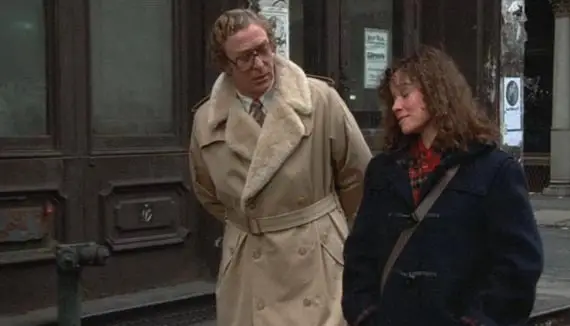
![]()
Sparkling Script
With so many lives, loves, passions and secrets all swirling around in episodic fashion, the script would fly apart at any moment if it weren’t in the sure hands of Allen. Throughout the many turns and overlaps of his characters’ relationships, Allen never once loses the humanity in any of them. Each is his or her own being, given ample design in a tangled web of what we so casually call family.
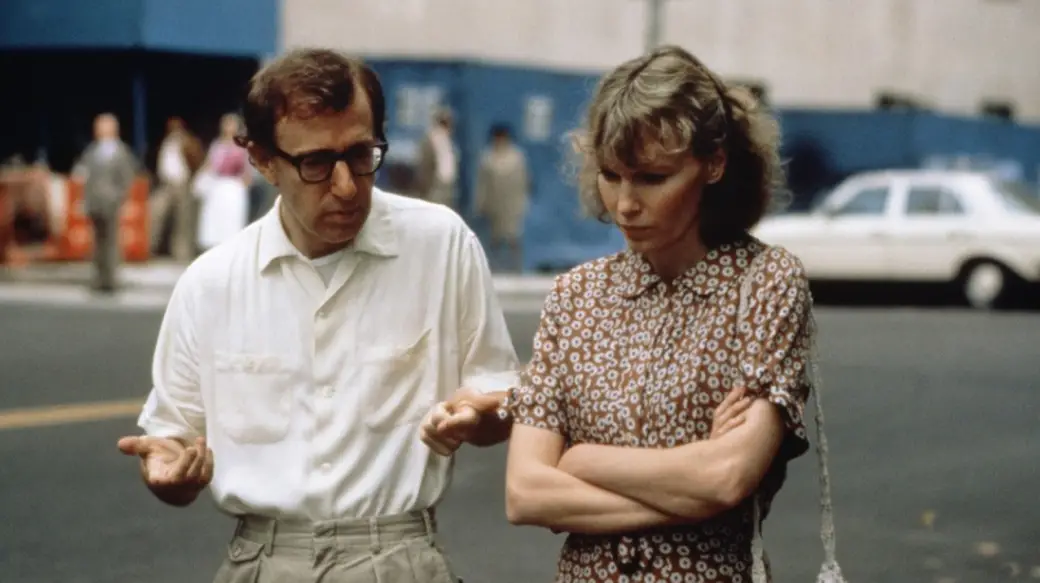 This balancing act earned Allen his second screenplay Oscar after Annie Hall (1977) and became one of four scripts to make the WGA’s Top 101 Screenplays of All Time. The script is packed with laugh-out-loud one-liners (a father’s comparison between Nazis and a can opener) and reversed expectations (Mickey unloading his religious paraphernalia). Still, Allen’s biggest strength as a writer is his ability to layer his characters with realistic compartmentalization. In successfully creating two states of mind — the mind-body complex — Allen draws attention to the absurd paradoxes we humans live with each day, our ability to think one thing logically, and do another thing lustfully.
This balancing act earned Allen his second screenplay Oscar after Annie Hall (1977) and became one of four scripts to make the WGA’s Top 101 Screenplays of All Time. The script is packed with laugh-out-loud one-liners (a father’s comparison between Nazis and a can opener) and reversed expectations (Mickey unloading his religious paraphernalia). Still, Allen’s biggest strength as a writer is his ability to layer his characters with realistic compartmentalization. In successfully creating two states of mind — the mind-body complex — Allen draws attention to the absurd paradoxes we humans live with each day, our ability to think one thing logically, and do another thing lustfully.
This theme is most apparent in a scene where Elliot first professes his love to Lee. Having already engaged in romantic teases in a bookstore, the two stand in Lee’s apartment listening to a Bach record. As the music plays, both feel the need to engage in formal small talk (“So I have to get my teeth clean.” “That’s nice”), while deep down wanting their passions to break free. Allen recognizes that both levels of the human condition exist in us simultaneously, building a tension between Elliot and Lee that is simultaneously ironic, absurd and hilarious.
![]()
Underrated Director
While many hail Allen for his writing, he remains underrated behind the camera. In the aforementioned sexual-tension scene between Elliot and Lee, note Allen’s pan to Lee’s nude portrait as Elliot tries to contain his emotion; his placement of an E.E. Cummings book (pun intended) between their bodies; and the jarred record needle, shifting to a more upbeat tempo to match the changing mood of the scene (Allen’s song selection is impeccable throughout, from big band to jazz to classical).
Note also his ability to turn pop culture meeting grounds (libraries, record stores) into symbolic compositions of mise-en-scene. Note the record albums that appear behind Cliff and Holly in the record store, the rock section behind Cliff, and the jazz section behind Holly, showing they’ve changed from their earlier failed date conversation. Note also Elliot and Lee in the bookstore, as the camera tracks behind bookshelves in true Allen form, blocking view of the characters as if to juxtapose a constant world of books (ancient and timeless) against the petty lives of human beings (emotional and fleeting).
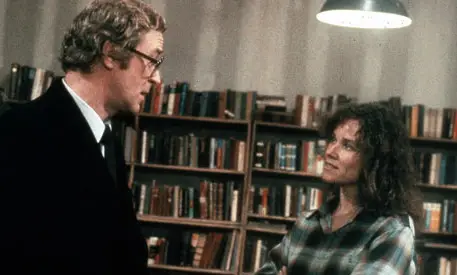 Yet as much as Allen’s filmmaking accents human inferiority in a grand universe, he also chooses to carefully dissect each of these “inconsequential” lives, through voice-over of their inner monologue, or a circling camera around a Hannah-Holly-Lee lunch date. Here, Allen encapsulates the three sisters as a cohesive unit, while focusing on the individual reactions of each.
Yet as much as Allen’s filmmaking accents human inferiority in a grand universe, he also chooses to carefully dissect each of these “inconsequential” lives, through voice-over of their inner monologue, or a circling camera around a Hannah-Holly-Lee lunch date. Here, Allen encapsulates the three sisters as a cohesive unit, while focusing on the individual reactions of each.
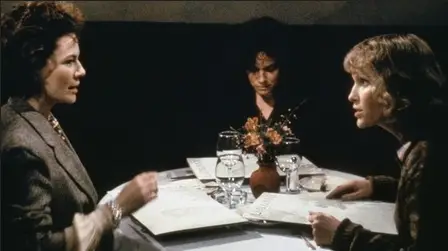
Note, however, the camera never focuses on Hannah for any extended period of time in this scene. This is wholly indicative of Hannah’s place in her family. She is the listening ear of others’ needs, but never has any needs of her own. As such, those around her actually come to resent her perfection (her sisters metaphorically coming between she and her husband in Allen’s positioning of nightstand photos), to the point that her husband erupts, “It’s hard to be around someone who gives so much and has no needs of her own!” In this way, Hannah is much like the adult version of Manhattan‘s Tracy, a flawless person of almost fantastical proportions, an ideal for Allen, but one which he admits is probably impossible in a world of deeply flawed people.
![]()
The Message
If humanity is so deeply flawed, suffering from a contradictory mind-body complex and the fleeting moments of our own mortality, what’s Allen’s message? Just be yourself. Even if that’s bizarre or idiosyncratic, your unpredictability is necessary to our being. We may fear the unpredictability of our lives and those who come to shape it, but in the end, we welcome them because, to quote Annie Hall (1977), “we need the eggs.”
Allen is nothing if not a life pontificator. His death-fearing Mickey is an unrivaled example of mankind’s struggle for a sense of meaning, and becomes the perfect instrument for Allen’s own manifesto on faith, doubt and human existence. How fitting, in the year after The Purple Rose of Cairo (1985), that Allen’s existential study come to a head in a movie house, as Mickey finally finds comfort by stumbling wearily into a screening of the Marx Brothers’ Duck Soup (1933).
This moment is the fruition of Allen’s Manhattan claim that Groucho Marx is one of the things that makes “life worth living,” but it is also the moment he realizes that only two things really matter in life: luck (i.e. a sweaty head on a gun barrel) and love (“the heart is truly a resilient muscle”). But, if love is the most important, consider his earlier statement that “love is unpredictable.” What does this really say toward Allen’s view on life?
For all this, Hannah and Her Sisters runs circles around most of the efforts that pass for modern romantic comedies. If you wish to see the alignment of every key Woody Allen theme, told with the maturity of his career-peaking sensibility, it doesn’t get much better than Hannah and Her Sisters. When his career is over, after decades upon decades of dominance, we may look back at Annie Hall as his most groundbreaking; Manhattan as his most New York; The Purple Rose of Cairo as his personal favorite; Crimes and Misdemeanors as his most tragic; Midnight in Paris as his most successful; and Hannah and Her Sisters as his most universally satisfying.
![]()
